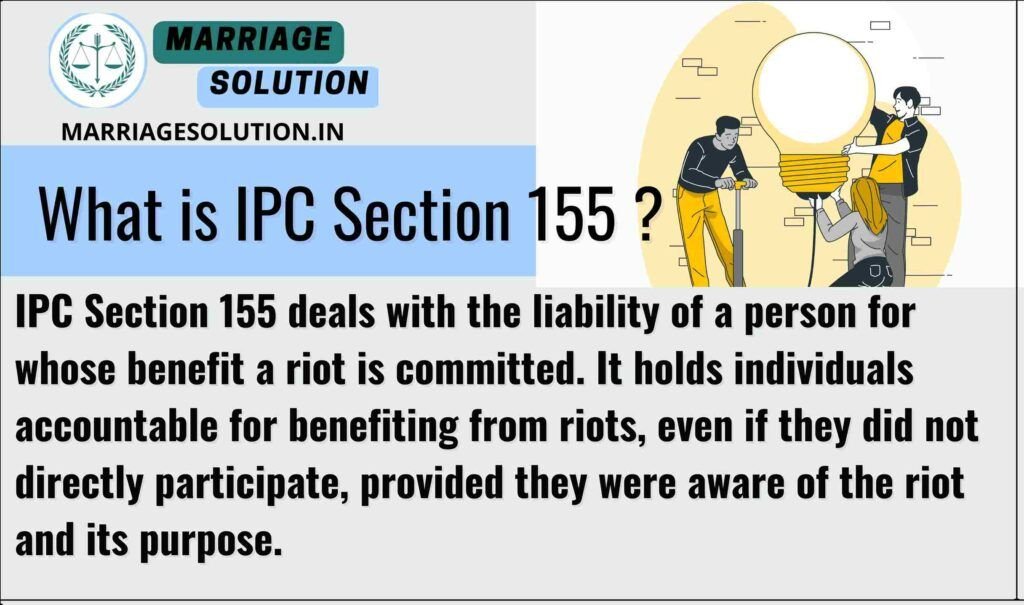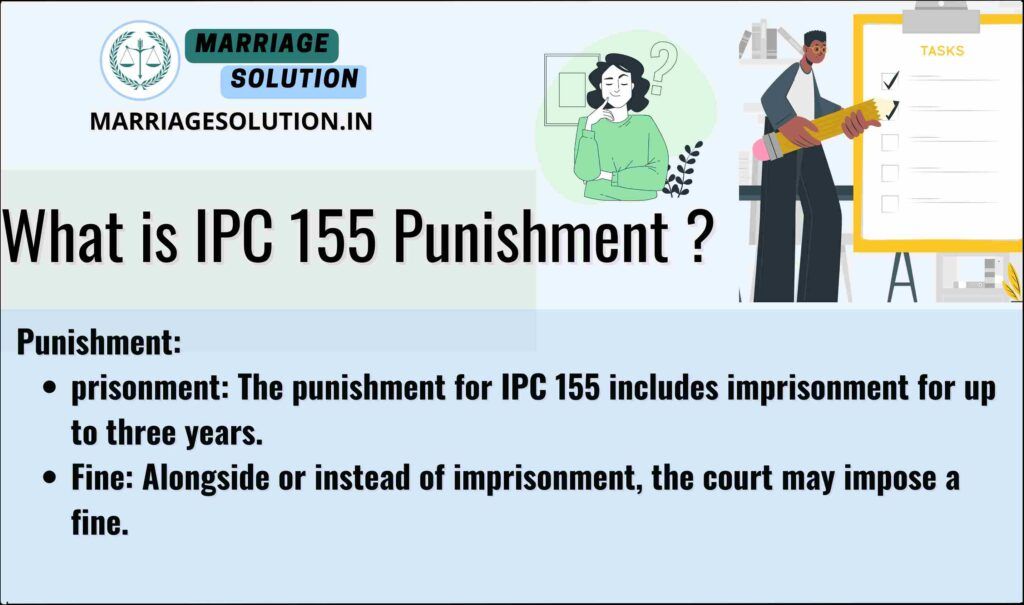Introduction of 155 IPC
Section 155 IPC addresses the offense of liability of persons for whose benefit a riot is committed. This provision aims to hold accountable those who benefit from riots, even if they didn’t directly participate. IPC 155 plays a crucial role in discouraging individuals or groups from instigating riots for personal gain. It recognizes that those who profit from civil unrest share responsibility for the damage and disruption caused. This section serves as a deterrent against orchestrating riots through proxies and ensures that beneficiaries of such acts face legal consequences.
- Introduction of 155 IPC
- What is IPC Section 155 ?
- Section 155 IPC in Simple Points
- IPC Section 155 Overview
- IPC Section 155: Liability of Beneficiaries of Riots and Unlawful Assemblies
- 1. Holding Indirect Beneficiaries Accountable
- 2. Definition of “Benefit” Under IPC 155
- 3. Encouraging or Supporting Riots
- 4. Role of Knowledge and Intent
- 5. Financial and Material Support
- 6. Connection Between Beneficiaries and Rioters
- 7. Severity of the Riot and Punishment
- 8. Prevention of Organized Riots
- 9. Legal Burden of Proof
- 10. Punishment and Consequences
- Examples of IPC 155
- IPC Section 155: Liability of Beneficiaries of Riots and Unlawful Assemblies
- IPC 155 Punishment
- 155 IPC bailable or not ?
- Section 155 IPC in short information
- 155 IPC FAQs
- If you need support with court proceedings or any other legal matters, don’t hesitate to reach out for assistance.
What is IPC Section 155 ?
IPC Section 155 deals with the liability of a person for whose benefit a riot is committed. It holds individuals accountable for benefiting from riots, even if they did not directly participate, provided they were aware of the riot and its purpose.

Section 155 IPC in Simple Points
1. Liability for Benefiting from a Riot
IPC Section 155 ensures that individuals who gain from a riot or unlawful assembly, even without directly participating, can be held legally responsible. This includes those who incite, encourage, or fund such activities for personal or financial gain. The law recognizes that some individuals may manipulate situations for their benefit, even if they are not present at the crime scene. By targeting these hidden beneficiaries, IPC 155 prevents indirect support for unlawful gatherings, ensuring that all responsible parties face justice.
2. Holding Indirect Supporters Accountable
The law does not just punish rioters but also those who provide financial, material, or strategic support to unlawful assemblies. Even if a person does not physically participate in the violence, they can be prosecuted if they were aware of the riot and played a role in its execution. This prevents individuals from hiding behind others while still orchestrating disorder. Courts consider factors such as money transfers, communication records, and witness testimonies to establish the connection between the supporter and the riot.
3. Punishment for Offenders
People found guilty under IPC 155 may face fines, imprisonment, or both, depending on the severity of the riot and the extent of their involvement. If it is proven that they played a significant role in funding or encouraging the violence, stricter penalties may apply. The punishment aims to serve as a deterrent, preventing individuals from misusing riots for political, economic, or personal advantages. This ensures that the consequences of unlawful assemblies do not just fall on those directly involved but also on those who enable them.
4. Proof of Knowledge and Intent
For an individual to be convicted under IPC 155, the prosecution must prove that they knowingly benefited from or contributed to the riot. Courts analyze evidence such as financial records, communications, and witness statements to determine whether the accused had prior knowledge of the riot. Even if a person did not physically organize the riot, their intent and connection to the incident play a crucial role in legal proceedings. Establishing intent is key to ensuring that innocent individuals are not wrongfully convicted under this section.
5. Role in Preventing Future Riots
IPC 155 acts as a preventive measure by discouraging individuals and organizations from using riots as tools for personal gain. By penalizing those who benefit from such incidents, the law removes the motivation for orchestrating violence. This helps maintain peace and stability, ensuring that riots are not used as a strategy for economic or political manipulation. Law enforcement agencies rely on this provision to curb organized violence and bring hidden perpetrators to justice, thereby safeguarding public order.
IPC Section 155 Overview
According to IPC Section 155, any person who knowingly benefits from a riot or unlawful assembly, whether financially, politically, or otherwise, can be held accountable. This includes those who incite, fund, or promote such acts.
IPC Section 155: Liability of Beneficiaries of Riots and Unlawful Assemblies
1. Holding Indirect Beneficiaries Accountable
If a person gains financial, political, or personal benefits from a riot, they can be punished under IPC 155.
This means even those who are not physically present but encourage violence for their gain can be held liable.
For example, if a businessman supports a riot to harm a competitor, they will face legal action.
2. Definition of “Benefit” Under IPC 155
A benefit can be money, power, influence, or any personal advantage gained from the riot.
Even if the benefit is indirect or delayed, the law still applies.
For instance, a politician who encourages violence to win elections may be prosecuted.
3. Encouraging or Supporting Riots
A person can be punished if they motivate, fund, or promote a riot in any way.
Support can be through money, speeches, social media, or providing resources to rioters.
For example, a leader who asks people to attack a community can be held guilty.
4. Role of Knowledge and Intent
A person must know that the riot is happening for their benefit to be held responsible.
Even if they did not directly order the violence, their awareness and indirect role make them liable.
For example, if a business owner knows a riot will remove their competition and does nothing, they can be charged.
5. Financial and Material Support
Providing money, weapons, transport, food, or shelter to rioters is a crime under IPC 155.
If someone funds a riot to create unrest or gain power, they will be punished.
For example, a rich person paying people to destroy shops can be prosecuted.
6. Connection Between Beneficiaries and Rioters
If a person associates with rioters or benefits from their actions, they can be held accountable.
Courts check for meetings, money transfers, or messages that prove a connection.
For example, a landowner hiring goons to force tenants out will face legal action.
7. Severity of the Riot and Punishment
If a riot causes serious harm like deaths or property damage, the punishment is stricter.
For example, if a riot leads to violence and a person benefits, their penalty will be higher.
Even if the damage is small, the guilty party still faces punishment under this law.
8. Prevention of Organized Riots
This law discourages businessmen, politicians, and criminals from secretly organizing riots.
People who know they can be punished for indirect involvement will think twice before encouraging violence.
For example, a politician using riots to spread fear before elections can be punished.
9. Legal Burden of Proof
The court needs strong proof to convict a person under IPC 155.
Evidence such as money transactions, messages, or witness statements is required.
For example, if someone transferred money to rioters, it can be used as proof against them.
10. Punishment and Consequences
A person guilty under IPC 155 can be fined, depending on how much they benefited.
There is no jail term, but a conviction can damage their business, political career, or reputation.
For example, a businessman convicted under this law may lose public trust and suffer losses.
Examples of IPC 155
🔹 Example 1: Business Rivalry
A shop owner secretly pays a group to riot and damage a competitor’s store. Even though the shop owner did not participate in the violence, they benefited from it. Under IPC 155, they can be punished for encouraging and funding the riot.
🔹 Example 2: Political Gain
A politician secretly funds a violent protest to create unrest before elections. The riots make the ruling government look weak, benefiting the politician. Since they indirectly caused the riot for personal gain, IPC 155 can be applied against them.
IPC 155 Punishment
Imprisonment: The punishment for IPC 155 includes imprisonment for up to three years.
Fine: Alongside or instead of imprisonment, the court may impose a fine.

155 IPC bailable or not ?
IPC Section 155 is a non-bailable offense. If a person is arrested under this section, they do not have an automatic right to bail. The accused must apply to the court for bail, and the decision rests with the judge. Factors considered include the severity of the riot, the accused’s involvement or benefit, flight risk, tampering with evidence, and potential impact on public order.
Section 155 IPC in short information
| IPC Section | Offense | Punishment | Bailable/Non-Bailable | Cognizable/Non-Cognizable | Trial By |
|---|---|---|---|---|---|
| IPC 155 | Liability for benefiting from a riot or unlawful assembly | Fine, imprisonment, or both | Bailable | Non-Cognizable | Magistrate |
155 IPC FAQs
Is IPC 155 applicable only to individuals directly involved in riots?
No, IPC 155 applies to individuals who benefit from riots, even if they were not directly involved but were aware of the riot and gained from it.
What constitutes ‘benefit’ under IPC Section 155?
‘Benefit’ can include financial gain, political advantage, social influence, or any form of profit derived from the riot, whether direct or indirect.
Is IPC 155 a bailable offense?
No, IPC 155 is a non-bailable offense. Bail is at the discretion of the court based on factors like severity, involvement, and public safety concerns.
If you need support with court proceedings or any other legal matters, don’t hesitate to reach out for assistance.
Court or any other marriage-related issues, our https://marriagesolution.in/lawyer-help-1/ website may prove helpful. By completing our enquiry form and submitting it online, we can provide customized guidance to navigate through the process effectively. Don’t hesitate to contact us for personalized solutions; we are here to assist you whenever necessary!
Right to Information RTI act :Your Comprehensive Guide (Part 1)
The Right to Information (RTI) Act : Explore the essence of the Right to Information (RTI) Act through this symbolic image. The image features legal documents, emphasizing the importance of transparency and accountability in governance. The scales of justice represent…
What is Article 371 of Indian Constitution ?
Article 371 of the Indian Constitution grants special provisions to specific states and regions within India, addressing their unique historical, social, and cultural circumstances. These provisions aim to accommodate diverse needs and protect cultural identities within the constitutional framework.
Indian Labour law : Your Comprehensive Guide (Part 1)
The purpose of labour laws is to safeguard employees and guarantee equitable treatment at the workplace, encompassing aspects such as remuneration, security, and perks. These regulations establish a secure ambiance by imposing minimum wage requirements, ensuring factory safety measures are…
GST :Your Comprehensive Guide (Part 1 – Understanding the Basics)
The Goods and Services Tax (GST) is like a big change in how we pay taxes in India. It started on July 1, 2017, and it’s here to simplify things. Before GST, we had many different taxes, and it could…





